Kathryn Troy's Blog, page 10
June 30, 2019
Dreams of Ice and Shadow Promotion until the Fourth of July
From now until July 4th, the second installment of my vampire fantasy series, Dreams of Ice and Shadow, will be free on Amazon. Now's the perfect time to catch up on this beach-worthy read -click here to pick yours up today!
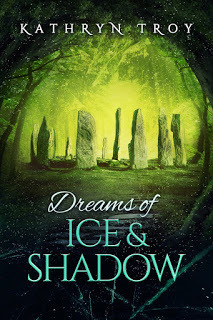
Luca has discovered his father's hideout. He hunts the legendary vampire alone, pushing Katelyn away to safety. But Dracula is not so easily bested. He evades Luca so he can tap into Katelyn's power--the magic that lies at the heart of Icarya. Luca's heart sinks as his father draws him further and further from his eternal love.
Across the Great Sea, Katelyn is summoned to the slave city Likhan. After the death of Seht Reza, Likhan teeters toward revolution as her nephew Darien seeks the throne. To help him, Kate must work alongside Alaric, the assassin who will stop at nothing to win her back in Luca's absence. The dark forces mounting against Darien leave Kate vulnerable to the destructive pull of her elemental nature.
Dreams of Ice and Shadow is the heart-stopping second volume of the Frostbite series, where gothic terrors invade epic fantasy. Sinister, unnatural horrors are unleashed, and Katelyn and Luca's passions burn brighter than ever as the dangers facing Icarya threaten to separate them forever.

Luca has discovered his father's hideout. He hunts the legendary vampire alone, pushing Katelyn away to safety. But Dracula is not so easily bested. He evades Luca so he can tap into Katelyn's power--the magic that lies at the heart of Icarya. Luca's heart sinks as his father draws him further and further from his eternal love.
Across the Great Sea, Katelyn is summoned to the slave city Likhan. After the death of Seht Reza, Likhan teeters toward revolution as her nephew Darien seeks the throne. To help him, Kate must work alongside Alaric, the assassin who will stop at nothing to win her back in Luca's absence. The dark forces mounting against Darien leave Kate vulnerable to the destructive pull of her elemental nature.
Dreams of Ice and Shadow is the heart-stopping second volume of the Frostbite series, where gothic terrors invade epic fantasy. Sinister, unnatural horrors are unleashed, and Katelyn and Luca's passions burn brighter than ever as the dangers facing Icarya threaten to separate them forever.
Published on June 30, 2019 10:24
June 25, 2019
Maybe's it's Mostly the Same, but I Still Liked It: Roswell, New Mexico
I was one of those people who was in high-school just when Roswell aired on television. It was one of my favorite shows at the time. So of course I gave
Roswell, New Mexico
a spin.
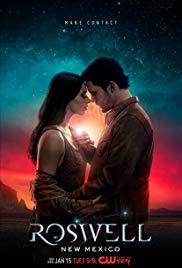 This all seems so familiar...The majority of reviews of this show are correct, that it does follow the plot of the show (based on the books) fairly closely. But the added wrinkle that these characters are adults, not teenagers, means that their relationships can be even more complicated, and there's a layer of many years between when they were teens to now that add heft to those connections. Those connections between past and present can have great potential that they may have only just begun to tap in this season.
This all seems so familiar...The majority of reviews of this show are correct, that it does follow the plot of the show (based on the books) fairly closely. But the added wrinkle that these characters are adults, not teenagers, means that their relationships can be even more complicated, and there's a layer of many years between when they were teens to now that add heft to those connections. Those connections between past and present can have great potential that they may have only just begun to tap in this season.
For something that's supposed to be a secret, it seems like the whole town learns about the extraterrestrial nature of Max, Michael, and Isobel fairly quickly. This was something that grew very steadily in the original show over the course of several seasons, so that element of secrecy felt facetious and a bit rushed.
The individuality of their powers was more developed here, and that clarity was appreciated. So was the more authentic representation of New Mexico as being a state with a diverse population. Although many times the way in which questions of immigration and the Trump administration are handled is very transparent and heavy-handed. The show may not age well for those reasons, where it would be fairly easy for new audiences to watch the original Roswell and not feel alienation (forgive the word) in terms of the sense of place.
They also rushed through the developments of the fourth alien and his relationship to the dynamic trio. Again, it felt like the whole original show was rushed into this first season. Perhaps that means they can do more fresh plotting in a second season. At least I do hope that. Though it was fine as a show it was just too similar to really merit existence, unless they can take this show to a new level. I suppose it's just another way of rewatching a show without actually rewatching it.
K Rating: 3/5
 This all seems so familiar...The majority of reviews of this show are correct, that it does follow the plot of the show (based on the books) fairly closely. But the added wrinkle that these characters are adults, not teenagers, means that their relationships can be even more complicated, and there's a layer of many years between when they were teens to now that add heft to those connections. Those connections between past and present can have great potential that they may have only just begun to tap in this season.
This all seems so familiar...The majority of reviews of this show are correct, that it does follow the plot of the show (based on the books) fairly closely. But the added wrinkle that these characters are adults, not teenagers, means that their relationships can be even more complicated, and there's a layer of many years between when they were teens to now that add heft to those connections. Those connections between past and present can have great potential that they may have only just begun to tap in this season.For something that's supposed to be a secret, it seems like the whole town learns about the extraterrestrial nature of Max, Michael, and Isobel fairly quickly. This was something that grew very steadily in the original show over the course of several seasons, so that element of secrecy felt facetious and a bit rushed.
The individuality of their powers was more developed here, and that clarity was appreciated. So was the more authentic representation of New Mexico as being a state with a diverse population. Although many times the way in which questions of immigration and the Trump administration are handled is very transparent and heavy-handed. The show may not age well for those reasons, where it would be fairly easy for new audiences to watch the original Roswell and not feel alienation (forgive the word) in terms of the sense of place.
They also rushed through the developments of the fourth alien and his relationship to the dynamic trio. Again, it felt like the whole original show was rushed into this first season. Perhaps that means they can do more fresh plotting in a second season. At least I do hope that. Though it was fine as a show it was just too similar to really merit existence, unless they can take this show to a new level. I suppose it's just another way of rewatching a show without actually rewatching it.
K Rating: 3/5
Published on June 25, 2019 09:46
June 17, 2019
Missing Something: A Fever of the Blood
The Strings of Murder was one of the best starts to a series I've read recently. I thoroughly enjoyed both McGray and Frey as an odd pairing of uptight British and rough-and-tumble Scottish detective as they investigate cases with supernatural underpinnings. I was especially excited by the fact that the second book in the series,
Fever of the Blood
, was set to tackle witchcraft, especially the infamous witches of Pendle Hill, who I actually lecture about in my history classes.
![A Fever of the Blood: A Novel by [de Muriel, Oscar]](https://i.gr-assets.com/images/S/compressed.photo.goodreads.com/hostedimages/1560863123i/27687835.jpg)
The investigation elements of this book were just as good as the first, and I especially liked the way in which witchcraft was defined, but the story was lacking the same fervor and intensity of the first title. We focused more on McGray's family situation in this book, and I did miss some of the domestic drama from Frey's background from The Strings of Murder, or at least seeing how events of the previous book continued to play out. It wasn't just that McGray's family story was not as interesting, but that it felt one-note. We didn't learn significantly more than we knew the first time around about his insane sister, and the story (and McGray) were spinning their wheels in this title rather than moving forward as a character and as a partner to Frey. So their dynamic felt a little stale and taken for granted as well, and I would have like to see some more interesting growth between them as they got themselves tangled up with the biggest nest of witches in Britain.
I mentioned before that I really loved how witchcraft was depicted here - one final thing I'd like to say about that is that when I read the author's note at the back of the book, de Muriel said that he used some ideas from Latin American and Mexican ideas of witchcraft as well. I thought the inclusion of those concepts were fantastic, and I would love to see something from him (in this series or otherwise), than can show that unique flavor a bit more prominently!
Still looking forward to the next installment, which is always a good thing.
K. Rating: 4/5
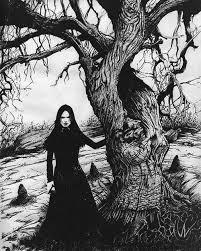 A great place to start any story, don't you think?
A great place to start any story, don't you think?
![A Fever of the Blood: A Novel by [de Muriel, Oscar]](https://i.gr-assets.com/images/S/compressed.photo.goodreads.com/hostedimages/1560863123i/27687835.jpg)
The investigation elements of this book were just as good as the first, and I especially liked the way in which witchcraft was defined, but the story was lacking the same fervor and intensity of the first title. We focused more on McGray's family situation in this book, and I did miss some of the domestic drama from Frey's background from The Strings of Murder, or at least seeing how events of the previous book continued to play out. It wasn't just that McGray's family story was not as interesting, but that it felt one-note. We didn't learn significantly more than we knew the first time around about his insane sister, and the story (and McGray) were spinning their wheels in this title rather than moving forward as a character and as a partner to Frey. So their dynamic felt a little stale and taken for granted as well, and I would have like to see some more interesting growth between them as they got themselves tangled up with the biggest nest of witches in Britain.
I mentioned before that I really loved how witchcraft was depicted here - one final thing I'd like to say about that is that when I read the author's note at the back of the book, de Muriel said that he used some ideas from Latin American and Mexican ideas of witchcraft as well. I thought the inclusion of those concepts were fantastic, and I would love to see something from him (in this series or otherwise), than can show that unique flavor a bit more prominently!
Still looking forward to the next installment, which is always a good thing.
K. Rating: 4/5
 A great place to start any story, don't you think?
A great place to start any story, don't you think?
Published on June 17, 2019 13:52
June 2, 2019
Not Quite Heaven-Sent: The Angel's Game
![The Angel's Game (The Cemetery of Forgotten Book 2) by [Zafon, Carlos Ruiz]](https://i.gr-assets.com/images/S/compressed.photo.goodreads.com/hostedimages/1559580356i/27612837.jpg) I was very excited to read
The Angel's Game
, the second installment of Carlos Ruis Zafon's Cemetery of Forgotten Books Series. I loved The Shadow of the Wind, and was anxious to delve back into Zafon's lush prose and beautiful rendering of postwar Barcelona.
I was very excited to read
The Angel's Game
, the second installment of Carlos Ruis Zafon's Cemetery of Forgotten Books Series. I loved The Shadow of the Wind, and was anxious to delve back into Zafon's lush prose and beautiful rendering of postwar Barcelona.I was drawn in by the quality of the writing. But as I neared the end of this tale of a writer of cheap sensational novels who takes on a mysterious gig that seems to have driven the last occupant of his house mad, I realized that even though the writing was phenomenal, the storytelling was not. The tone of the book's language is more like literary fiction with a hint of the gothic, but for the kind of narrative Zafon set forth, his language didn't actually carry the genre. That might sound weird to say, but it wasn't the same kind of experience that I'd expect if I were reading the same premise written by any of the top names in horror. There was some indefineable, intangible aspect that was lacking, and though the plot moved fairly smoothly from one point to the next, I didn't feel an emotional connection, wasn't compelled by the mystery. One that seemed fairly obvious from the get-go, and a little bit stale. Maybe it's the word choices, or how the mood is set, but it just didn't read right for me, and it was a huge letdown.
I also found the protagonist to be less and less believable as I read through the book, making decisions that went against his own practical, self-serving nature and risked everything he held dear for essentially a writing gig that he professes didn't mean as much to him as his own works. So to see his world fall apart for something that ostensibly wasn't worth it, even to him, was jarring.
It is sad to say that I most likely will not pick this author up again, as my reading of this one took a bit of the luster off Shadow of the Wind for me too. What was a great first book now felt formulaic, and taken together, they were lacking the chops to write about monsters and demons in a way that can feel compelling.
K Rating: 2/5
Published on June 02, 2019 06:31
May 26, 2019
Fell Apart at the 3/4 Mark: Bohemian Gospel
Bohemian Gospel is an interesting mix of historical fiction and fantasy. Mouse, the orphan girl who has lived all her life in a cloistered church until she teams up with Bohemia's new king Ottakar, has supernatural abilities-she is able to work her will, and is a miracle healer, which earns her the young king's admiration and an (undefined) place in his royal court. Her power lies in her voice, thus the nickname - she fears her own words, lest she accidentally do or say something she didn't intend with grave consequences.
![Bohemian Gospel: A Novel (The Bohemian Trilogy) by [Carpenter, Dana Chamblee]](https://i.gr-assets.com/images/S/compressed.photo.goodreads.com/hostedimages/1558975567i/27579286.jpg) It was an intruiging setup, one that I haven't seen before, with lots of vivid historical details that would satisfy the most avid reader of historical fiction. I loved the character Mouse, and seeing her inner struggle to both accept what she could do but also feel that it came from someplace less than godly, which is why she has no family and no ties, even to the people who raised her, who feared her. Ottakar sees her gifts as a benefit to him, and the two characters grow side-by-side in an engrossing narrative.
It was an intruiging setup, one that I haven't seen before, with lots of vivid historical details that would satisfy the most avid reader of historical fiction. I loved the character Mouse, and seeing her inner struggle to both accept what she could do but also feel that it came from someplace less than godly, which is why she has no family and no ties, even to the people who raised her, who feared her. Ottakar sees her gifts as a benefit to him, and the two characters grow side-by-side in an engrossing narrative.
However, this book suffers from something that's become an increasingly common pattern in the fiction that I've been reading: the tight narrative just unravels in the last quarter of the book. As the stakes for Mouse's relationship with Ottakar become higher and higher, and Mouse uses more of her powers, the author switched gears from the narrative tone throughout the book to turn Mouse's life into one of pure, unmitigated suffering. She had suffered, to be sure, but her life and experience up to that point had been more nuanced and complex. And I certainly didn't think there'd be a happy ending for an essential nobody who falls in love with a king. But it went beyond that, to the point of feeling gratuitous. The only purpose I saw in the trajectory of Mouse's story towards the end of the novel was to essentially cut her off from anything you've spent the last few hundred pages reading about, just to get you to an ending that, really, didn't feel like it fit the book at all. I can't say more than that really without giving it away, but it was a very unsatisfying and lengthy conclusion. Not because I sympathized with the plight of the characters, which would have been a fine ending, but because the ending I did get felt so disjointed and contrived. There's really no other way to put it. So while I might pick up another title by this author who engrossed me for most of the book, I'll go into it with a very wary mind.
K. Rating: 3/5
![Bohemian Gospel: A Novel (The Bohemian Trilogy) by [Carpenter, Dana Chamblee]](https://i.gr-assets.com/images/S/compressed.photo.goodreads.com/hostedimages/1558975567i/27579286.jpg) It was an intruiging setup, one that I haven't seen before, with lots of vivid historical details that would satisfy the most avid reader of historical fiction. I loved the character Mouse, and seeing her inner struggle to both accept what she could do but also feel that it came from someplace less than godly, which is why she has no family and no ties, even to the people who raised her, who feared her. Ottakar sees her gifts as a benefit to him, and the two characters grow side-by-side in an engrossing narrative.
It was an intruiging setup, one that I haven't seen before, with lots of vivid historical details that would satisfy the most avid reader of historical fiction. I loved the character Mouse, and seeing her inner struggle to both accept what she could do but also feel that it came from someplace less than godly, which is why she has no family and no ties, even to the people who raised her, who feared her. Ottakar sees her gifts as a benefit to him, and the two characters grow side-by-side in an engrossing narrative.However, this book suffers from something that's become an increasingly common pattern in the fiction that I've been reading: the tight narrative just unravels in the last quarter of the book. As the stakes for Mouse's relationship with Ottakar become higher and higher, and Mouse uses more of her powers, the author switched gears from the narrative tone throughout the book to turn Mouse's life into one of pure, unmitigated suffering. She had suffered, to be sure, but her life and experience up to that point had been more nuanced and complex. And I certainly didn't think there'd be a happy ending for an essential nobody who falls in love with a king. But it went beyond that, to the point of feeling gratuitous. The only purpose I saw in the trajectory of Mouse's story towards the end of the novel was to essentially cut her off from anything you've spent the last few hundred pages reading about, just to get you to an ending that, really, didn't feel like it fit the book at all. I can't say more than that really without giving it away, but it was a very unsatisfying and lengthy conclusion. Not because I sympathized with the plight of the characters, which would have been a fine ending, but because the ending I did get felt so disjointed and contrived. There's really no other way to put it. So while I might pick up another title by this author who engrossed me for most of the book, I'll go into it with a very wary mind.
K. Rating: 3/5
Published on May 26, 2019 09:29
May 19, 2019
Injuns and Fairies and Blacks, Oh My!: Alias Hook
Fairy tale re-tellings are not always my thing, and for good reason. They usually are not anywhere near as good as their source material, and more often than not only serve to highlight the author's lack of their own originality and imagination.
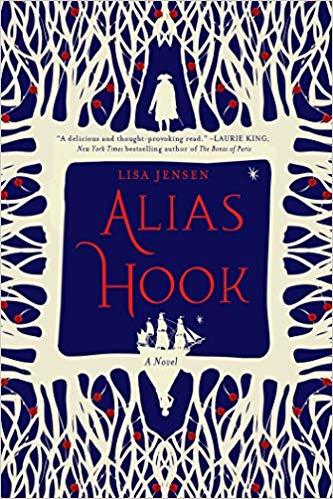 Alias Hook did something much, much worse. In Lisa Jensen's retelling of Peter Pan from the perspective of Captain Hook, she either ignorantly or willfully perpetuated some of the racial stereotypes than ran rampant in Sir Barrie's work.
Alias Hook did something much, much worse. In Lisa Jensen's retelling of Peter Pan from the perspective of Captain Hook, she either ignorantly or willfully perpetuated some of the racial stereotypes than ran rampant in Sir Barrie's work.
The main thrust of the story shows how Captain Hook came to be in Neverland, and is ostensibly about him finding redemption and an escape from the murderous boy Peter through love. That part was fine - good, even, except her protagonist felt like a thinly veiled Claire Fraser. But the dire problem with this book is that Hook's path to redemption is a spiritual journey that is paved by racial otherness. The curse of being stuck in Neverland is thrust upon him by a spurned lover, who is first described as an obeah woman (which would be more Jamaican in its ancestry), but then later as a Voudo priestess (from West African states like Benin and Togo, and then transmuted into voodoo in Haiti and French America). Her treatment Afro-Caribbean of traditions as interchangeable is bad enough, but no matter which legitimate religions and cultural traditions she's co-opting, Prosperpina is always portrayed as a witch. Sorry, but witchcraft and non-Christian are absolutely not the same thing, and it felt utterly ignorant and disrespectful.
Worse still, at least for me personally given my research background in this exact phenomenon, was her portrayal of American Indians in the Neverland. Again, there was a mashup demonstrating her complete lack of cultural understanding or distinction that makes umbrella terms like "Indian" useless: teepees (Plains) and canoes (coastal) go hand-in-hand here, and they portrayed as are patriarchal, which is the exact opposite of many indigenous political structures. They are predictably stoic and mystical, and their simple, naturalist, romantic speech is the product of nineteenth-century white writers like James Fenimore Cooper (see The Leatherstocking Tales ), who constructed a concept of Indianness for white consumption, and is just as racially injust as blackface minstrelry. That language is replicated in this book, in the 21st century, as if there's not a damn thing wrong with it.
The most heinous and egregious choice is her description of these figures as real Indians who have fled Earth to protect their way of life. So Jensen has actually bought wholesale the nineteenth-century myth that Indians were vanished, a dying race, and that there was no place left for them on Earth. My professional historical opinion on seeing this false narrative re-written for the sake of literature is that it endorses the atrocities endured by countless Amerindian cultures at the hands of white Christendom, and is an abomination that flies in the face of all that indigenous people have endured since first contact, and all the struggles to establish their cultural and political sovereignty in the face of powerful forces that labeled their culture as static and obsolete- an Indian was only an Indian in leather and feathers. It's a disgrace to living American Indians everywhere. That the author would be oblivious to the implications of her writing I find hard to believe in this day and age, and to willfully ignore the damage such representations have done and continue to do is utterly unacceptable.
When people of color are lumped into the same mystical categories as fairies, the perpetrators of such literary atrocities must be called out and made to answer. If the representation of racial otherness and cultural appropriation in literature matter to you at all, I urge you to abstain from purchasing this work, and any other written by Lisa Jensen.
 Alias Hook did something much, much worse. In Lisa Jensen's retelling of Peter Pan from the perspective of Captain Hook, she either ignorantly or willfully perpetuated some of the racial stereotypes than ran rampant in Sir Barrie's work.
Alias Hook did something much, much worse. In Lisa Jensen's retelling of Peter Pan from the perspective of Captain Hook, she either ignorantly or willfully perpetuated some of the racial stereotypes than ran rampant in Sir Barrie's work.The main thrust of the story shows how Captain Hook came to be in Neverland, and is ostensibly about him finding redemption and an escape from the murderous boy Peter through love. That part was fine - good, even, except her protagonist felt like a thinly veiled Claire Fraser. But the dire problem with this book is that Hook's path to redemption is a spiritual journey that is paved by racial otherness. The curse of being stuck in Neverland is thrust upon him by a spurned lover, who is first described as an obeah woman (which would be more Jamaican in its ancestry), but then later as a Voudo priestess (from West African states like Benin and Togo, and then transmuted into voodoo in Haiti and French America). Her treatment Afro-Caribbean of traditions as interchangeable is bad enough, but no matter which legitimate religions and cultural traditions she's co-opting, Prosperpina is always portrayed as a witch. Sorry, but witchcraft and non-Christian are absolutely not the same thing, and it felt utterly ignorant and disrespectful.
Worse still, at least for me personally given my research background in this exact phenomenon, was her portrayal of American Indians in the Neverland. Again, there was a mashup demonstrating her complete lack of cultural understanding or distinction that makes umbrella terms like "Indian" useless: teepees (Plains) and canoes (coastal) go hand-in-hand here, and they portrayed as are patriarchal, which is the exact opposite of many indigenous political structures. They are predictably stoic and mystical, and their simple, naturalist, romantic speech is the product of nineteenth-century white writers like James Fenimore Cooper (see The Leatherstocking Tales ), who constructed a concept of Indianness for white consumption, and is just as racially injust as blackface minstrelry. That language is replicated in this book, in the 21st century, as if there's not a damn thing wrong with it.
The most heinous and egregious choice is her description of these figures as real Indians who have fled Earth to protect their way of life. So Jensen has actually bought wholesale the nineteenth-century myth that Indians were vanished, a dying race, and that there was no place left for them on Earth. My professional historical opinion on seeing this false narrative re-written for the sake of literature is that it endorses the atrocities endured by countless Amerindian cultures at the hands of white Christendom, and is an abomination that flies in the face of all that indigenous people have endured since first contact, and all the struggles to establish their cultural and political sovereignty in the face of powerful forces that labeled their culture as static and obsolete- an Indian was only an Indian in leather and feathers. It's a disgrace to living American Indians everywhere. That the author would be oblivious to the implications of her writing I find hard to believe in this day and age, and to willfully ignore the damage such representations have done and continue to do is utterly unacceptable.
When people of color are lumped into the same mystical categories as fairies, the perpetrators of such literary atrocities must be called out and made to answer. If the representation of racial otherness and cultural appropriation in literature matter to you at all, I urge you to abstain from purchasing this work, and any other written by Lisa Jensen.
Published on May 19, 2019 10:48
May 12, 2019
Solid Legal Thriller - The Ex
It's hard for a die-hard Law and Order fan like myself to be surprised by legal thrillers. There are just so many of those episodes, dealing with so many different stories, that I can sniff out a killer before the first commercial break. So it means a lot to say that Alafair Burke's
The Ex
kept me guessing.
[image error] Defense lawyer Olivia is called upon to defend her ex-fiance Jack in a multiple murder case, where the victims include the man responsible for the death of Jack's wife and mother of his child. This case had everything fans of the genre could hope for. A complex case with multiple, viable suspects, a few different avenues of inquiry with some bombshell discoveries, a solid grounding in forensic-speak, and some emotional baggage for Jack and Olivia that was never settled. On top of all that, what you think will be the easiest solution is something that Burke grapples with throughout the story. It doesn't feel so simple, then, when Olivia goes back and forth with her own doubts about Jack's innocence. So whichever way you slice it, you won't see it coming. It's very, very clever writing. My only regret is that the resolution comes in such a rushed way that I didn't feel I had enough time to really absorb the final solution and see how it played out for all characters involved.
Honestly, this story could have been beefed up with even more nuance and detail - I could have read something 1.5 times as long. That just goes to show, though, how much I enjoyed it. I've never read Burke before, but I'll be back for a second helping soon. It's nice to see there are still some solid thriller writers in the world. For a while there, I was getting worried.
K. Rating: 5/5
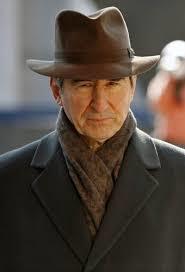 You'd be proud of some great lawyering, McCoy.
You'd be proud of some great lawyering, McCoy.
[image error] Defense lawyer Olivia is called upon to defend her ex-fiance Jack in a multiple murder case, where the victims include the man responsible for the death of Jack's wife and mother of his child. This case had everything fans of the genre could hope for. A complex case with multiple, viable suspects, a few different avenues of inquiry with some bombshell discoveries, a solid grounding in forensic-speak, and some emotional baggage for Jack and Olivia that was never settled. On top of all that, what you think will be the easiest solution is something that Burke grapples with throughout the story. It doesn't feel so simple, then, when Olivia goes back and forth with her own doubts about Jack's innocence. So whichever way you slice it, you won't see it coming. It's very, very clever writing. My only regret is that the resolution comes in such a rushed way that I didn't feel I had enough time to really absorb the final solution and see how it played out for all characters involved.
Honestly, this story could have been beefed up with even more nuance and detail - I could have read something 1.5 times as long. That just goes to show, though, how much I enjoyed it. I've never read Burke before, but I'll be back for a second helping soon. It's nice to see there are still some solid thriller writers in the world. For a while there, I was getting worried.
K. Rating: 5/5
 You'd be proud of some great lawyering, McCoy.
You'd be proud of some great lawyering, McCoy.
Published on May 12, 2019 12:28
May 5, 2019
Satisfyingly Simple Thriller - Cash on Demand
I'll watch anything with Peter Cushing in it. And the fact that I was on the lookout for classic thrillers meant there was no escape from watching Cash on Demand (1961).
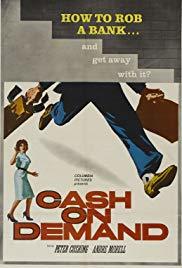 This film is a somewhat modern take on the timeless story "A Christmas Carol," where a miserly banker must learn the value of his family and employees. And time for his lesson is running out, as a conman wriggles his way into the bank manager Fordyce's (Cushing's) office, and convinces him that his wife and child will die if he does not assist the conman in emptying out the bank's bloated safe. Good thing Fordyce is a constant, fastidious pain in the ass, or his underlings would never have surmised that something fishy was underfoot. The twists and turns as Fordyce goes against his own rigid nature for the sake of his family was quite thrilling.
This film is a somewhat modern take on the timeless story "A Christmas Carol," where a miserly banker must learn the value of his family and employees. And time for his lesson is running out, as a conman wriggles his way into the bank manager Fordyce's (Cushing's) office, and convinces him that his wife and child will die if he does not assist the conman in emptying out the bank's bloated safe. Good thing Fordyce is a constant, fastidious pain in the ass, or his underlings would never have surmised that something fishy was underfoot. The twists and turns as Fordyce goes against his own rigid nature for the sake of his family was quite thrilling.
The conman (Andre Morell) was fantastic - he was a completely effective and entirely believable social manipulator, which was such a refreshing view of vintage criminality given that we tend to associate the term social manipulator with more modern, identify-based schemes. It was nice to see this film move beyond the stayed trope of a bad guy pointing a gun. It was much more conniving, and the thief and his methods get right under your skin.
I recommend this to all fans of Cushing or crime thrillers- it won't disappoint.
K. Rating: 4.5/5
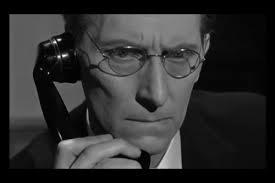 Everything this man touches turns to gold
Everything this man touches turns to gold
 This film is a somewhat modern take on the timeless story "A Christmas Carol," where a miserly banker must learn the value of his family and employees. And time for his lesson is running out, as a conman wriggles his way into the bank manager Fordyce's (Cushing's) office, and convinces him that his wife and child will die if he does not assist the conman in emptying out the bank's bloated safe. Good thing Fordyce is a constant, fastidious pain in the ass, or his underlings would never have surmised that something fishy was underfoot. The twists and turns as Fordyce goes against his own rigid nature for the sake of his family was quite thrilling.
This film is a somewhat modern take on the timeless story "A Christmas Carol," where a miserly banker must learn the value of his family and employees. And time for his lesson is running out, as a conman wriggles his way into the bank manager Fordyce's (Cushing's) office, and convinces him that his wife and child will die if he does not assist the conman in emptying out the bank's bloated safe. Good thing Fordyce is a constant, fastidious pain in the ass, or his underlings would never have surmised that something fishy was underfoot. The twists and turns as Fordyce goes against his own rigid nature for the sake of his family was quite thrilling.The conman (Andre Morell) was fantastic - he was a completely effective and entirely believable social manipulator, which was such a refreshing view of vintage criminality given that we tend to associate the term social manipulator with more modern, identify-based schemes. It was nice to see this film move beyond the stayed trope of a bad guy pointing a gun. It was much more conniving, and the thief and his methods get right under your skin.
I recommend this to all fans of Cushing or crime thrillers- it won't disappoint.
K. Rating: 4.5/5
 Everything this man touches turns to gold
Everything this man touches turns to gold
Published on May 05, 2019 14:38
April 28, 2019
Magical Mob Boss - The Wish Granter
Though Redwine's re-imagined fairy tales have been popular for some time, The Wish Granter is the first one that I've picked up. I was a bit afraid that I wouldn't care for something that would be geared towards a Young Adult audience, or something that had the writing quality of Twilight and massacred beloved fairy tales that I appreciate in all their dark glory.
![The Wish Granter (Ravenspire Book 2) by [Redwine, C. J.]](https://i.gr-assets.com/images/S/compressed.photo.goodreads.com/hostedimages/1556539444i/27429848.jpg) I was pleasantly surprised. The writing was sound, the fantastical world was well fleshed-out and believable, and the romantic interest between the new princess and the swordsmith Sebastian kept me turning pages. I especially liked the complexity of his character as someone who had an abusive father and could thrive in the dark seedy underbelly of the city, but at the same time was fearful and vulnerable. He was arguably the most interesting character I've read in a good long while, so I really enjoyed that.
I was pleasantly surprised. The writing was sound, the fantastical world was well fleshed-out and believable, and the romantic interest between the new princess and the swordsmith Sebastian kept me turning pages. I especially liked the complexity of his character as someone who had an abusive father and could thrive in the dark seedy underbelly of the city, but at the same time was fearful and vulnerable. He was arguably the most interesting character I've read in a good long while, so I really enjoyed that.
I enjoyed the princess a bit less, simply because I don't like it when female characters are forcefully depicted as spunky. I'm not saying they can't be witty, or intelligent, or go against the grain, I'm all for that, but it did feel like the book tried to hard to depict her that way rather than finding some other organic way to display that element of her character. Her actions were more believable than her nonchalant dialogue, and so her voice and speech mannerisms were the thing that really didn't sit well, although taken as a whole she was sufficient.
The thing about this book that puzzled me the most was the Wish Granter himself. He was written more as a vicious mob boss. I'm not saying that's not threatening, but it seemed out of place in a fantasy book, and I felt that his villainy was so expansive that it read as unsustainable, and I would have preferred to see him be more devious and cunning, rather than always coming in guns blazing. The elements that did hew a bit closer to fairy tales were the parts that worked for me. (Loved the living breathing house and the crone who tends it for him).
All in all, I'm interested to read other titles in the Ravenspire series. So that's a win.
K. Troy: 4/5
![The Wish Granter (Ravenspire Book 2) by [Redwine, C. J.]](https://i.gr-assets.com/images/S/compressed.photo.goodreads.com/hostedimages/1556539444i/27429848.jpg) I was pleasantly surprised. The writing was sound, the fantastical world was well fleshed-out and believable, and the romantic interest between the new princess and the swordsmith Sebastian kept me turning pages. I especially liked the complexity of his character as someone who had an abusive father and could thrive in the dark seedy underbelly of the city, but at the same time was fearful and vulnerable. He was arguably the most interesting character I've read in a good long while, so I really enjoyed that.
I was pleasantly surprised. The writing was sound, the fantastical world was well fleshed-out and believable, and the romantic interest between the new princess and the swordsmith Sebastian kept me turning pages. I especially liked the complexity of his character as someone who had an abusive father and could thrive in the dark seedy underbelly of the city, but at the same time was fearful and vulnerable. He was arguably the most interesting character I've read in a good long while, so I really enjoyed that.I enjoyed the princess a bit less, simply because I don't like it when female characters are forcefully depicted as spunky. I'm not saying they can't be witty, or intelligent, or go against the grain, I'm all for that, but it did feel like the book tried to hard to depict her that way rather than finding some other organic way to display that element of her character. Her actions were more believable than her nonchalant dialogue, and so her voice and speech mannerisms were the thing that really didn't sit well, although taken as a whole she was sufficient.
The thing about this book that puzzled me the most was the Wish Granter himself. He was written more as a vicious mob boss. I'm not saying that's not threatening, but it seemed out of place in a fantasy book, and I felt that his villainy was so expansive that it read as unsustainable, and I would have preferred to see him be more devious and cunning, rather than always coming in guns blazing. The elements that did hew a bit closer to fairy tales were the parts that worked for me. (Loved the living breathing house and the crone who tends it for him).
All in all, I'm interested to read other titles in the Ravenspire series. So that's a win.
K. Troy: 4/5
Published on April 28, 2019 16:04
April 22, 2019
When an Inspiration Becomes a Crutch- Heartstone
![Heartstone (Heartstone Series Book 1) by [White, Elle Katharine]](https://i.gr-assets.com/images/S/compressed.photo.goodreads.com/hostedimages/1556022292i/27402121.jpg) I picked up Heartstone because it promised a romantic fantasy with dragons, which I don't read as often as I should. But what I hadn't seen in my earliest exposure to the book was that it was inspired by Pride and Prejudice. I'm well aware of the romantic classic, having read it many years ago, and I am well aware of just how popular this title continues to be. However, I have generally shied away from books that are re-imaginings of old books, and this title in particular. Its character dynamics and quirks are not really my cup of tea when it comes to romance. I prefer smoldering looks and deep longing, rather than snide put-downs and uptight indignation. I was going to back away automatically when I realized that's what I held in my hands, but it was already in my hands, so I gave it a shot.
I picked up Heartstone because it promised a romantic fantasy with dragons, which I don't read as often as I should. But what I hadn't seen in my earliest exposure to the book was that it was inspired by Pride and Prejudice. I'm well aware of the romantic classic, having read it many years ago, and I am well aware of just how popular this title continues to be. However, I have generally shied away from books that are re-imaginings of old books, and this title in particular. Its character dynamics and quirks are not really my cup of tea when it comes to romance. I prefer smoldering looks and deep longing, rather than snide put-downs and uptight indignation. I was going to back away automatically when I realized that's what I held in my hands, but it was already in my hands, so I gave it a shot.I wanted to like this book a lot more than I did like this book. The fantasy elements were quite satisfying - the creatures were those you'd expect in a fantasy book - ogres, dragons, wyverns, and such, but the way all these species interacted with each other and with humans felt easy and natural, and not overly complicated. That was enjoyable, and I wish more on that front had been put on offer.
The romance - well, I already said I didn't care for Elizabeth and Darcy, didn't I? So why would I swoon over Daired and Aliza (yeah, really), when Daired is a 100% purebred asshole? He was absolutely the most unlikeable romantic lead I have ever encountered. So it was satisfying, in a way, to see Aliza turn him down flat when he proposes to her out of the clear blue, and actually insults her during the proposal. It was quite another thing to watch Aliza then fall for him in the span of a few pages. But when she does, it's semi-believable because Daired stops acting like an asshole, and acts like, I don't know, someone who might actually be attracted to her. And therein lies the real problem. Daired as a character is not believable at all. The author basically wrote him one way to build up animosity between them, and then wrote him as a completely different person after the proposal plot-point that is supposed to shift Aliza's view of him. He didn't actually change. He just poofed into a dreamboat. And that was forced, and contrived, and inorganic, and I couldn't relate. Which was a shame, because all the stuff going down with dragons and giant monster wyrms and banshees and all that was really something.
I hope this author writes more fantasy, and maybe can come up with characters of her own, and can stay authentic to them, rather than tying them in knots that make no sense, and make you see the puppeteer, rather than the characters.
K. Rating: 3/5
Published on April 22, 2019 11:37



